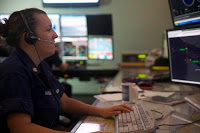Hyundai mis-Fortune
Lloyd’s List gives some insight on the Hyundai Fortune, which suffered a major disaster off the coast of Yemen. It would appear that this severe fire aboard the ship is not terrorrist related but possibly fireworks could be the cause.
London, Apr 5 — Independence Day parties in the US and other celebrations across North America and Europe could be without their traditional firework displays this summer because of safety fears following the c.c. Hyundai Fortune blaze. Hundreds of containers are due to be shipped from Asia in the next couple of months, but could instead be stranded on the quayside.
months, but could instead be stranded on the quayside.
Hyundai Merchant Marine, owner of the stricken containership that was almost split in two by explosions in the cargo hold a fortnight ago, has now put a total ban on firework shipments and other hazardous materials, according to importers.
The Korean line would not comment on the reports, but one of the largest shippers of fireworks told Lloyd’s List that HMM has imposed a moratorium, even though it shares the views of others that the blast and subsequent blaze on the 5,551 teu ship were probably caused by something else.
Bengt Henriksen, president of California-headquartered Quality Logistics, said the embargo had placed his company in a “dire situation” as it has more than 400 containers in the pipeline that are due to be shipped over the next few weeks ahead of the Jul 4 public holiday in the US. Neither he nor the Unaffiliated Shippers of America group that represents US firework importers believe correctly packed fireworks represent a risk.
But there is a widely-held suspicion in industry circles that cargo is being mislabelled, a practice thought to be particularly prevalent in the Asia to Europe trades where cargo tends to be shipped on a cost, insurance and freight basis. That places responsibility for arranging shipment on the exporter, rather than the importer. In contrast, firework shipments to the US are on free on board terms, placing control into the hands of the American importer that must comply with an array of strict safety regulations. Wrongly-marked cargo may be loaded into the hold rather than on deck, a situation that may have accounted for the Hyundai Fortune disaster.
In an email to Lloyd’s List, independent fireworks expert Charles Weeth, who investigated the Hanjin Pennsylvania fire, said modern fireworks formulae are very stable, “and only a series of packing, handling or other mistakes could possibly lead to their ignition onboard a ship.” More likely, he said, given the hole on the port side of the ship above the water line near the engine compartment, is a fire and explosion below decks which then ignited the cargo, including the fireworks, above deck.
The blaze on the Hanjin Pennsylvania in 2002 was thought to have been the result of fraudulent cargo declarations. Hyundai Fortune was heading from Asia to Europe when the fire broke out off the coast of Yemen. The crew escaped, but the hull is expected to be declared a total loss because of the devastation to the stern. Hundreds of containers have been destroyed. 
Several other lines had cargo on the HMM ship, including both its New World Alliance partners and members of the Grand Alliance. So far, other lines are not thought to have stopped loading fireworks. A spokesman for NYK, one of those with slots on Hyundai Fortune, said yesterday that it was still carrying fireworks “under strict conditions”, mostly loaded in Japan. But consortium partner Hapag-Lloyd said it does not accept any fireworks manufactured, classified or originated in China or Hong Kong.
Mr Henriksen, who was asked by HMM to put together a paper on the shipment of fireworks following the Hyundai Fortune disaster, is warning that there could be further such incidents unless rules are tightened up in the Asia to Europe trades. The paper concludes that fireworks shipments to US are highly regulated and importers in principle all abide by the rules as any violations have serious consequences. “Fireworks shipments to Europe are regulated but with rules differing by country. Importers have no responsibility and misdeclarations are rampant and almost accepted as a general practice. “We did it before, so why not again” is a standard reaction of China forwarders,” the paper states.
Of course , Cargo Law has some pretty dramatic pictures of the fire. Check them out.



